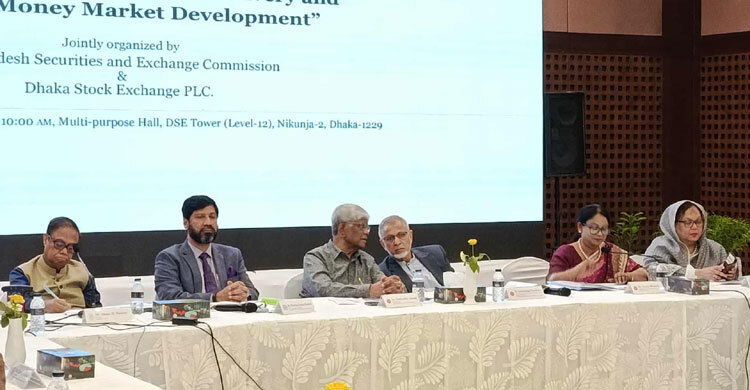03/05/2026

Pension funds should be invested in stocks: Salehuddin
Staff Correspondent | Published: 2025-09-22 22:05:55

Finance Advisor Salehuddin Ahmed has called for investing government employees’ pension funds in the stock market.
He said, “Large projects and new financing usually require risk sharing. What is risk sharing? You have to buy bonds, you have to buy equity.
“But in Bangladesh, we go to banks, take loans from there, and finance from there. That is what usually happens. From that perspective, as the governor pointed out, we must bring pensions into the stock market.”
However, he also highlighted the risks of investing pension funds in the market.
“Pension funds are considered public funds. The government has obligations here. It is not like private funds,” he said, adding that the government must take responsibility if public funds are used for market financing.
Taxpayer anger looms over poor service
Dr Salehuddin Ahmed also warned that citizens will grow increasingly frustrated if they continue to pay taxes without receiving commensurate public services in return.
Speaking at a seminar titled “Unveiling Bangladesh’s Bond and Sukuk Market: Revenue Status, Infrastructure Implementation and Islamic Money Market Development”, jointly organised by the Bangladesh Securities and Exchange Commission (BSEC) and the Dhaka Stock Exchange (DSE), Dr Salehuddin drew a sharp contrast with developed nations.
“In foreign countries, even when people pay higher taxes, they receive quality public services. Here, people pay taxes but get little or nothing in return. Naturally, they will become angry,” he said.
He added, “I often tell my colleagues at the National Board of Revenue (NBR): ‘Brother, provide even a little service. If you deliver good services, people will willingly pay more in taxes. But if you offer no services while demanding more fees and making citizens run around ten times, that’s simply not sustainable.’”
The seminar also featured remarks from Dr Anisuzzaman Chowdhury, Special Assistant to the Chief Adviser and Chairman of the Capital Market Development Committee; Dr Ahsan H Mansur, Governor of Bangladesh Bank; and Nazma Mobarek, Secretary of the Financial Institutions Division.
The keynote address was delivered by Professor M Kabir Hasan of the University of New Orleans, USA. The event was presided over by BSEC Chairman Khondaker Rashed Maksud.
Dr Salehuddin identified chronic underfunding as the root of Bangladesh’s governance challenges. “Wherever we sit, government officials assume everything can be provided – ‘Give this, give that.’ But our financial capacity is limited. Our tax and non-tax revenues remain critically low.”
He pointed out that the private sector is overly reliant on investment banks, while demand for large-scale projects continues to rise. “The biggest challenge we face today is our inability to finance the social security sector. We talk about increasing health sector allocations – then we pivot to education. But where is the money?”
On the popular demand for tax cuts, he cautioned: “Everyone wants taxes reduced – no one wants to pay. But if revenues shrink further, we may not even be able to pay salaries and allowances. Look at Brazil, their tax-to-GDP ratio is 26%. Ours is just 7.2%. They pay taxes and get services. We pay, and get nothing.”
Dr Salehuddin emphasised the urgent need to strengthen Bangladesh’s capital markets and expand the use of Sukuk bonds to reduce the country’s over-dependence on bank financing for both public and private projects.
“Bangladesh’s financial system is dangerously reliant on bank loans and defaults are rampant. This is our tragedy,” he said.
“A vibrant capital market and active private sector participation are essential for risk-sharing. Investors, especially small ones, must understand that bonds, debentures, and securities carry risks. The capital market is not a guaranteed income stream.”
He urged BSEC and DSE to launch investor education initiatives to dispel the myth that stock market investments are risk-free.
On Sukuk, Dr Salehuddin noted its untapped potential: “We have over Tk 24,000 crore in Sukuk instruments but nearly all are used for government projects. The private sector must also leverage Sukuk to fund infrastructure and business ventures.”
He highlighted the necessity of securitisation for mega-projects like the Mass Rapid Transit (MRT) system, which require investments running into thousands of crores. However, he acknowledged legal hurdles and government liability concerns, particularly regarding pension and gratuity fund investments, that currently impede progress.
The Finance Adviser also criticised the insurance sector as “chaotic” and in dire need of reform. “A dynamic financial system must include not just banks, but a robust capital market, a reformed insurance sector, and specialised fiscal instruments.”
Above all, he stressed the importance of rebuilding public trust. “People must see the link between paying taxes and receiving services. That connection, that social contract, is the ultimate test of good governance.”
Bangladesh Bank Governor Ahsan H Mansur said that long-term financing through pensions could help raise demand for bonds.
“The public pension system can be considered a source of long-term investment and can create demand for bonds,” he said.
The governor also supported making savings certificates “tradable”.
“The government can take quick steps if it wishes. Savings certificates are now partly linked with the market, but they must be made fully tradable. This will benefit customers, create a secondary market, and increase liquidity. With a little political will, this can be done,” he said.
Ahsan added that Bangladesh Bank and the Bangladesh Securities and Exchange Commission are working on bond market development and will soon place recommendations before the interim government.
“Both conventional and sukuk (Islamic bonds) segments are included in the recommendations,” Mansur said.
Editor & Publisher : Md. Motiur Rahman
Pritam-Zaman Tower, Level 03, Suite No: 401/A, 37/2 Bir Protik Gazi Dastagir Road, Purana Palton, Dhaka-1000
Cell : (+88) 01706 666 716, (+88) 01711 145 898, Phone: +88 02-41051180-81